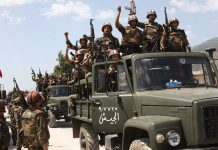لبنان: وعود باريس… وشيطان التفاصيل
إياد أبو شقرا/الشرق الأوسط/08 نيسان/18
في تقرير «الشرق الأوسط»، أمس، عن مؤتمر «سيدر» لدعم لبنان، شدد الرئيس الفرنسي إيمانويل ماكرون، راعي المؤتمر ومستضيفه، على أهمية «المتابعة الدقيقة» لنتائج المؤتمر الذي سيكون فاقد المعنى ما لم تحصل «تحوّلات جذرية» في لبنان. وأردف الرئيس الفرنسي «إذا ساعدنا لبنان فسنساعد المنطقة، وبالتالي، نكون بصدد مساعدة أنفسنا».
هذا كلام ذو دلالة كبرى، وبالأخص لدى مراجعة الصورة التذكارية للوفد اللبناني المشارك في «سيدر» مع الرئيس ماكرون، وفيها يبدو كلٌّ من رئيس الوزراء سعد الحريري، ومعه الوزراء علي حسن خليل (حركة أمل)، وجبران باسيل وسيزار أبي خليل (كلاهما من تيار الرئيس ميشال عون)، ويوسف فنيانوس (المَرَدة).
الوزراء الأربعة يمثّلون قوى قريبة من نظام دمشق. والملاحَظ أن المجتمع الدولي قرّر تجاهل ما ارتكبه هذا النظام على امتداد أكثر من 7 سنوات، وباشر عملية إعادة تأهيله بعد إنجاز ما تبقى من عمليات «هندسة ديموغرافية» مطلوبة في دوما بضواحي دمشق، والرستن وتلبيسة في محافظة حمص، ومناطق في حوران والجولان في الجنوب السوري.
حتى الرئيس الحريري نفسه، الذي اعتبر منذ تحالفه مع الرئيس عون كل ما يتحقق «منجزات» مبهرة، غدا عملياً جزءاً من «السيناريو اللبناني» المتكامل مع «التسوية السورية». وهو الذي فتح الباب رسمياً، بموافقته على «قانون الانتخاب» الذي فرضه حلف «حزب الله» – عون، أمام استعادة الراعي الإيراني لنظام دمشق وأتباعه زمام المبادرة السياسية داخل الساحة اللبنانية.
إن «التحفّظ» الذي ورد على غير لسان في باريس، بالأمس، يعود إلى تعمد تجاهل النتائج المتوقعة للانتخابات النيابية المقررة يوم 6 مايو (أيار) المقبل، والتستر على الاختراقات الكبرى الذي سيحققها محوَر طهران – دمشق. والواقع أن الجميع يدرك أن صمت «حزب الله» يخبّئ ارتياحه لما ستحمله تلك الانتخابات، ولا سيما أنه سيأتي موازياً لتصفية الانتفاضة الشعبية السورية بعد «تطويقها» بتنظيمات متطرّفة صادرتها وحرّفت مسارها، فأعطت صدقية مزيّفة لتهم نظام دمشق وموسكو وطهران لها كلها بـ«التكفير» و«الدعشنة».
مقرّرات «سيدر» تفيد بأن المشاركين الدوليين لم يعطوا لبنان «صكاً على بياض»، أي لم يطلقوا يد سلطاته من دون شروط، بل تمسّك المشاركون باعتماد «آلية متابعة» لما وصفوه بالإصلاحات المطلوبة لأي دعم مالي. إلا أن هذه «الآلية» تظل جزءاً من «التحفظ» شبه المفتعل إزاء حقيقة الوضع اللبناني، خصوصاً أن الرئيس الفرنسي يدرك جيداً تفاصيل هذا الوضع، وأيضاً يدركه مثله الأميركيون، ولكن سياق الأحداث يوحي بأن ثمّة سباقاً بين «الحلحلة» والمأزق. وهذا السباق لا ينفصل عن المناخ السائد في المنطقة ككل، وهو ما يعني أننا بتنا عند تقاطع خطوط الأزمات الإقليمية، من العراق، إلى سوريا ولبنان، ومنهما إلى اليمن، وعودة إلى ما تشهده الأراضي الفلسطينية المحتلة.
نحن، وفق المؤشرات، إزاء تعقيدات متزايدة في المقاربات الأميركية الروسية لمعظم الملفات التي تمسّ الشرق الأوسط. ولئن كانت إيران قد تموضعت حيث تعتقد أنها أضحت قادرة على المناورة أحياناً وإملاء الشروط أحياناً أخرى، فإن تركيا صارت حتى إشعار آخر في الضفة المقابلة لموقعها «الأطلسي»، حيث تتبادل الخدمات التكتيكية مع «الغريم التاريخي» روسيا. وهكذا، يبدو أن إسرائيل، المستفيدة من علاقاتها بكلٍّ من واشنطن وموسكو، هي اللاعب الإقليمي الوحيد الذي يواصل مشروعه الخاص من دون الأخذ في الحساب التوتر الطارئ على علاقات واشنطن وموسكو. وبخلاف ما يتصوّره البعض، فهذا المشروع لا ينحصر في حسم أمر الأراضي الفلسطينية المحتلة، والتحسّب لديموغرافية «ما بين البحر والنهر»، بل يشمل أيضاً إعطاء طابع علني للتوافقات والاعتبارات الضمنية بين تل أبيب ودمشق، واستطراداً، في ظل ربط لبنان بـ«سوريا الجديدة»، بين تل أبيب وبيروت. ولقد كان بدهياً لأي مراقب جاد أن «الاستغناء عن خدمات» النظام السوري ليس ضمن أولويات إسرائيل، ولو كان كذلك حقاً، لكان بمقدورها الدفع لإزاحته في عواصم القرار الغربية، وفي مقدمها واشنطن، التي دأبت سنوياً ولعقود – كما نذكر – على اتهامه بدعم الإرهاب.
كيفية تعامل واشنطن مع المشروع الإيراني الإقليمي، على الأقل بالنسبة إلى مستقبل سوريا ولبنان، مسألة في غاية الحيوية. أيضاً يستحق الرصد تطوّر العلاقات التعاونية – التنافسية بين موسكو وطهران في سوريا. وهل تتخلّى واشنطن وباريس عن «حصتهما» اللبنانية لموسكو بعدما تعايشتا – دون مشكلات تُذكر إبان إدارة باراك أوباما – مع هيمنة طهران عليه عبر «حزب الله»؟
ثم إن بين القضايا المركزية التي جرى التطرّق إليها في مؤتمر «سيدر» بالعاصمة الفرنسية موضوع النزوح السوري، وهو موضوع يثيره من منطلق طائفي وعدائي حلف «حزب الله» – عون… كلٌّ لمصلحته الطائفية، ومن منطلق معيشي البعض في المناطق ذات الكثافة السنّية التي احتضنت اللاجئين والنازحين… فعوقبت واضطُّهدت بعدما اتُّهمت بالتواطؤ مع «الإرهاب» و«التكفير».
إن جانباً مما يحدث في لبنان بهدف التسريع بفرض «الأمر الواقع» على سوريا هو حرمان النازح والمعارض السوري من حاضنة وطنية وسنّية. وبالفعل، فإن ثمة جهوداً مشتركة تُبذل في هذا الاتجاه، وهي تحظى برضا معظم العواصم الكبرى كلٌّ لمصالحها وحساباتها الخاصة. وكذلك نشأ توجّه في الشارع السنّي اللبناني اختار السير فيه بأمل التخلص من العبء الاقتصادي الذي يشكله النزوح السوري أولاً، وتحسين فرص دخول الرساميل الأجنبية والاستفادة منها ثانياً.
بناءً عليه، ستكون «انتخابات» مايو المقبل محطة مهمة جداً بالنسبة إلى جميع الأطراف، غير أن التفاؤل ضئيل لدى الطامحين إلى أن يخرج لبنان منها ببرامج وسياسات ذات صدقية. ذلك أن التحالفات التي نُسجت تحالفات ظرفية مصلحية، وطبيعة النظام الانتخابي (النسبي) ستؤدي إلى مزيد من الشرذمة تحت ستار «توسيع قاعدة التمثيل». أضف إلى ذلك أن الحصيلة المرتقبة في مناطق هيمنة «حزب الله» – وبالتالي، حجم الكتلة النيابية التي سيستند إليها – ستحول دون الخوض في أي بحث حقيقي حول مصير سلاحه، وعلاقته بالدولة، ومدى استقلاليته عن طهران.
الوعود جميلة… بعكس شيطان التفاصيل!
Middle East’s problems more complex than ever
Eyad Abu Shakra/Al Arabiya/April 11/18
The blood that was shed in the occupied Palestinian territories on the anniversary of ‘Land Day’ will be followed by more of the same if the ‘March of Return’ continues until Nakba Day on May 15.
The Palestinian wound has been bleeding for 70 years and, with the current Israeli and global leaders in place, the prospect of any meaningful compromise is virtually non-existent. Rather, it may be said that the conflict has never been so far from settlement as it is today, and there are a number of reasons for this.
The first reason is Palestinian division. This division serves the tactical interests of many regional and international players, as well as serving opportunistic groups within the Palestinian territories that benefit from the division. Therefore, despite the desire of every sincere Palestinian for unity, the beneficiaries are not willing to give up their gains.
Second, Israel’s continued evasion of peace. Any real peace must be based on a sincere desire for a coexistence that rejects oppression, domination, captivity or ‘transfer’. But, when we look at the political programs of the partisan Israeli forces, we can only conclude that the Israeli evasion of peace is fixed and that any other talk or goodwill is a variable.
A third reason is the regional reality. Despite the centrality of the ‘Question of Palestine’, it is no longer the only issue in the Middle East. As well as the occupied lands in Palestine, there are occupied lands in the ‘Palestines’ of Iraq, Syria, Lebanon and Yemen; and in addition to Israeli occupation, we now complain of Iranian, Turkish, Russian and American occupations in the region.
A deep understanding of the Middle East is vital, not only for the forces concerned with their own destinies but also the powers that deal with the region as a mere chessboard
The state of Israel
Fourth is the international situation. The state of Israel was originally established by a resolution adopted by the UN Security Council, which became the representative of global legitimacy after the end of the Second World War.
Yet, over the past 70 years, Israel has been one of the leading violators of UN resolutions, either through total disregard or thanks to the protection provided by the American veto. In fact, a major part of the region’s dilemma — and indeed the world’s dilemma — is the reliance of rogue governments on absolute power, or the protection of the American veto in the case of Israel, and Russian and Chinese vetoes in the case of Syria.
With regard to Syria, US President Donald Trump — in the midst of the tit-for-tat diplomat expulsions with Russia, and the accelerating sectarian cleansing by Moscow and Iran in Syria — announced his intention to withdraw US troops after “knocking the hell” out of ISIS.
Up to this point, the statement was clear. However, the second part of his speech was a bit strange, as he went on to say: “We’ll be coming out of Syria, like, very soon. Let the other people take care of it now.”
In Syria, the “other people” he referred to are Russian and Iranian forces, which are supposed to be Washington’s most serious opponents, both globally and regionally. Therefore, there is a need to clarify the background of what the American president meant; and here the issue of different priorities within the administration arises.
Apart from the recent changes that affected prominent figures — including replacing Secretary of State Rex Tillerson with Mike Pompeo and the appointment of John Bolton as National Security Advisor instead of H.R. McMaster — the power struggle within some US institutions is familiar, particularly, during Republican administrations. It is no secret that the biggest role in the preparation for the 2003 invasion of Iraq was played by the Pentagon and the ‘hawks’ in then-Defense Secretary Donald Rumsfeld’s team.
The ’big stick’ approach
Over the past two weeks, Washington observers have seen the removal of Tillerson and McMaster and the choice of Pompeo and Bolton as a double victory for the ‘big stick’ approach to foreign affairs at the expense of those who cherish compromise and soft diplomacy. A number of European allies have even expressed fears that the White House would adopt radical positions, but Trump’s words gave a completely different indication.
Undoubtedly, US foreign policy is not limited to one region of the world and is generally based on priorities, strategic and tactical balances, and compromises. Besides, many statements and initiatives are meant to be testers for the intentions of friends and foes.
However, as far as the Middle East is concerned, it is wise to deal with crises with two different approaches. First, the specifics of each case should be taken separately due to the different ‘composition’ of Arab entities and their geographic locations and demographics. Second, there is a need to recognize there are more pervasive dangers, beyond the current existential limits, that seek to change the broader regional reality.
A deep understanding of the Middle East is vital, not only for the forces concerned with their own destinies but also the powers that deal with the region as a mere chessboard. Consequently, if the policy used to deal with the phenomenon of Daesh — i.e. to treat the symptoms and neglect the causes — is repeated, the world will have to wait much more than 70 years before it is relieved of its Middle East concerns.






















